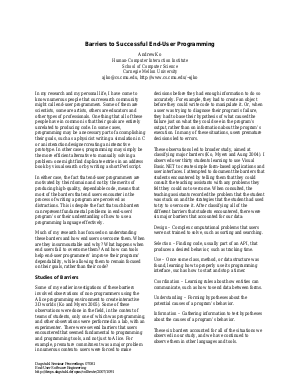Barriers to Successful End-User Programming
Author Andrew J. Ko
-
Part of:
Volume:
Dagstuhl Seminar Proceedings, Volume 7081
Part of: Series: Dagstuhl Seminar Proceedings (DagSemProc) - License:
 Creative Commons Attribution 4.0 International license
Creative Commons Attribution 4.0 International license
- Publication Date: 2007-07-03
File

PDF
DagSemProc.07081.4.pdf
- Filesize: 67 kB
- 2 pages
Document Identifiers
Subject Classification
Keywords
- End-user programming
- learning
- empirical studies
Metrics
- Access Statistics
-
Total Accesses (updated on a weekly basis)
0PDF Downloads0Metadata Views
Abstract
In my research and my personal life, I have come to know numerous people that our research community might call end-user programmers. Some of them are scientists, some are artists, others are educators and other types of professionals. One thing that all of these people have in common is that their goals are entirely unrelated to producing code. In some cases, programming may be a necessary part of accomplishing their goals, such as a physicist writing a simulation in C or an interaction designer creating an interactive prototype. In other cases, programming may simply be the more efficient alternative to manually solving a problem: one might find duplicate entries in an address book by visual search or by writing a short Perl script.
Cite As Get BibTex
Andrew J. Ko. Barriers to Successful End-User Programming. In End-User Software Engineering. Dagstuhl Seminar Proceedings, Volume 7081, p. 1, Schloss Dagstuhl – Leibniz-Zentrum für Informatik (2007)
https://doi.org/10.4230/DagSemProc.07081.4
BibTex
@InProceedings{ko:DagSemProc.07081.4,
author = {Ko, Andrew J.},
title = {{Barriers to Successful End-User Programming}},
booktitle = {End-User Software Engineering},
pages = {1--1},
series = {Dagstuhl Seminar Proceedings (DagSemProc)},
ISSN = {1862-4405},
year = {2007},
volume = {7081},
editor = {Margaret H. Burnett and Gregor Engels and Brad A. Myers and Gregg Rothermel},
publisher = {Schloss Dagstuhl -- Leibniz-Zentrum f{\"u}r Informatik},
address = {Dagstuhl, Germany},
URL = {https://drops.dagstuhl.de/entities/document/10.4230/DagSemProc.07081.4},
URN = {urn:nbn:de:0030-drops-10913},
doi = {10.4230/DagSemProc.07081.4},
annote = {Keywords: End-user programming, learning, empirical studies}
}
